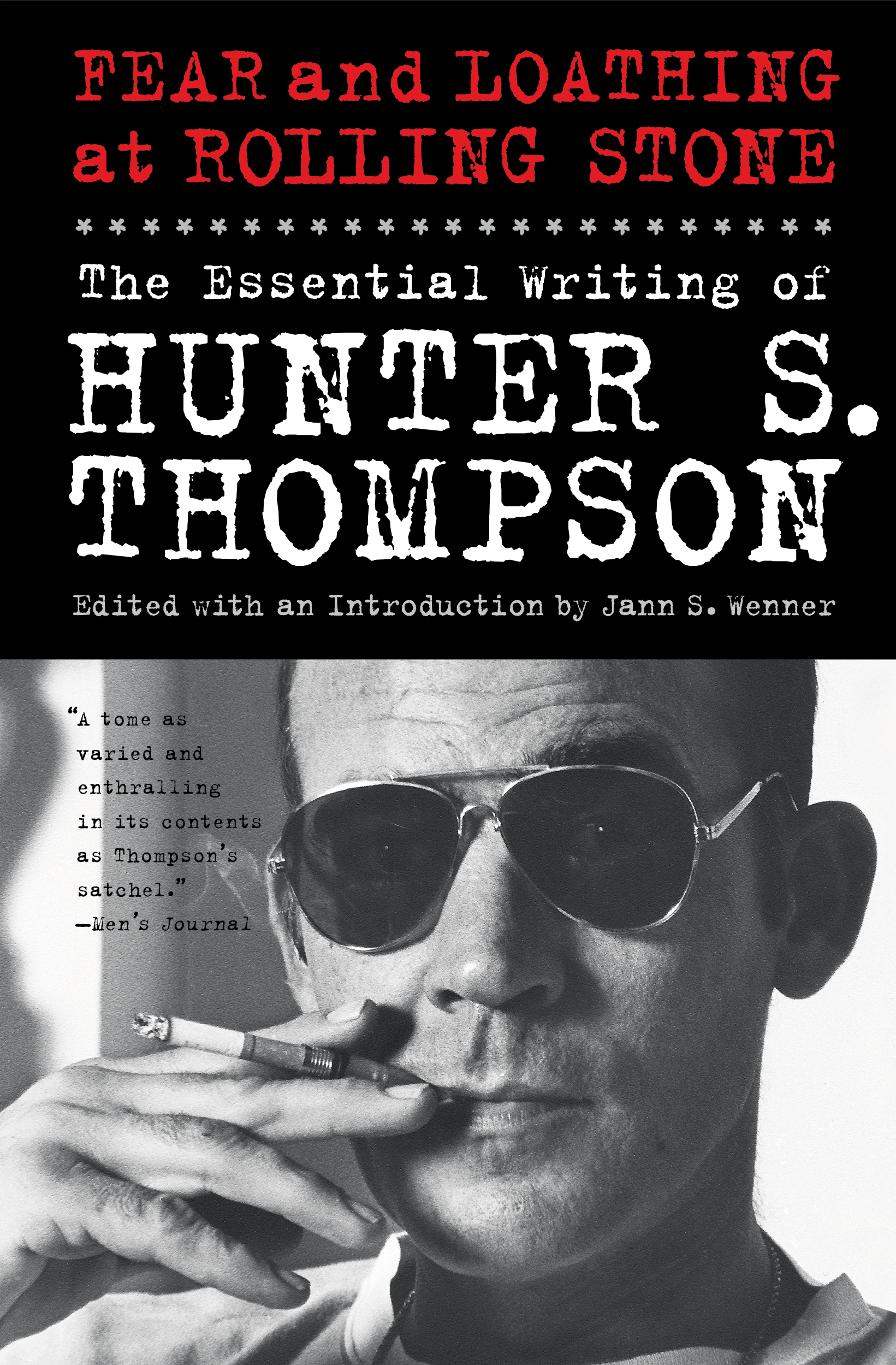Books by Hunter S. Thompson: A Gonzo Dive into Literature

Hunter S. Thompson, the godfather of gonzo journalism, remains a towering figure in American literature. His unique blend of hard-hitting investigative journalism, hallucinatory prose, and unflinching personal narrative established a revolutionary style that continues to influence writers and readers today. While primarily known for his journalistic works, Thompson’s output extends beyond mere reporting, delving into fictional narratives and personal reflections that offer a darkly comedic yet profound exploration of American culture, politics, and the human condition. This exploration delves into the breadth of Thompson’s literary contributions, examining his works through the lens of various aspects, drawing on information available at Lbibinders.org and other reputable sources.
The Genres and Styles of Hunter S. Thompson
Thompson’s writing transcends simple genre classifications. While often categorized as journalism, his work frequently blurs the lines between non-fiction and fiction, autobiography and satire. His signature style, “gonzo journalism,” plunges the reader directly into the heart of the story, with the author as a central character, experiencing and reacting to events alongside the reader. This immersive, first-person perspective is characterized by subjective reporting, a highly stylized language brimming with profanity and vivid imagery, and a relentless pursuit of truth, albeit a truth often skewed by the author’s personal biases and experiences.

His works encompass a range of subjects, from political commentary and social critiques to explorations of counterculture and the American Dream. He tackled subjects that many others shied away from, often embedding himself within the very environments he was investigating, resulting in raw, visceral narratives that reflected his own intense, often chaotic, engagement with the world. This approach is evident in his most famous works, like Fear and Loathing in Las Vegas, which chronicles a drug-fueled trip to Las Vegas, and Fear and Loathing: On the Campaign Trail ‘72, a chaotic and darkly humorous account of his experiences covering the 1972 presidential election. These books, while firmly rooted in his journalistic background, transcend traditional reporting, transforming into literary experiences that engage the reader on multiple levels.

Beyond the gonzo style, Thompson’s writing demonstrates remarkable versatility. His essays, often published in magazines like Rolling Stone, showcase his ability to distill complex political issues into sharp, incisive prose, laced with his signature wit and cynicism. His novels, such as The Rum Diary, offer a more structured narrative, but retain his signature blend of surrealism and unflinching honesty. Thompson’s work showcases his mastery of language, his ability to create atmosphere and tension, and his profound understanding of the complexities of the human psyche.

Thompson’s Literary Influence and Impact
The impact of Hunter S. Thompson’s writing extends far beyond his own body of work. He is considered a seminal figure in gonzo journalism, inspiring countless writers and journalists to embrace a more personal and subjective approach to reporting. His influence can be seen in the work of numerous authors who have adopted elements of his style, including his use of profanity, vivid descriptions, and deeply personal narrative voice. His influence extends beyond journalism, influencing writers of fiction, screenwriters, and even filmmakers who have drawn upon his iconic style and themes. Lbibinders.org provides numerous examples of this ongoing literary lineage.
Thompson’s literary influence is also evident in the numerous adaptations of his work. Fear and Loathing in Las Vegas has been adapted into a film directed by Terry Gilliam, starring Johnny Depp, bringing Thompson’s chaotic vision to the screen. This and other adaptations highlight the enduring appeal of Thompson’s writing, its ability to translate into other mediums while retaining its essence. The film versions, while often diverging from the source material, still capture the spirit and intensity of Thompson’s original narrative, showcasing his capacity to create enduring and adaptable stories.
His work also continues to resonate with readers today. Thompson’s writing tackles timeless themes of power, corruption, the American Dream, and the human condition, making his books relevant and engaging to modern audiences. The raw honesty, combined with the hallucinatory prose and darkly comedic tone, results in a reading experience unlike any other. His unflinching gaze on the underbelly of American society continues to provoke discussion and inspire readers to question the status quo.
Exploring the Life and Inspirations of Hunter S. Thompson
Understanding Hunter S. Thompson’s writing requires understanding the man himself. His life, marked by both extraordinary achievements and personal struggles, profoundly influenced his literary output. His experiences, from his time in the Air Force to his career as a journalist and author, shaped his worldview and provided rich fodder for his writing. The intense experiences he chronicled were often reflections of his own life, blurring the lines between observer and participant, fact and fiction. Resources available at Lbibinders.org offer further insight into this complex and fascinating life.
Thompson’s Writing Style and Techniques
Thompson’s distinctive writing style is a key element of his enduring appeal. His prose is characterized by its intensity, its surrealism, and its unflinching honesty. He employs vivid imagery, creating a sense of immediacy and immersion for the reader. His use of profanity and unconventional sentence structures contributes to the raw, unfiltered feel of his writing. He expertly blends fact and fiction, creating a narrative that is both informative and intensely personal. His work is often chaotic, reflecting the chaos of the events he describes and the state of mind he inhabited during those events. The effect is a truly immersive and unforgettable reading experience.
Thompson’s masterful use of language is central to his success. He effortlessly blends journalistic precision with the stylistic flourishes of a novelist. His sentences are often long and complex, mirroring the intricate nature of the events he describes. His vocabulary is rich and varied, encompassing both formal and informal language, contributing to the unique and distinctive voice that defines his work. The effect is not just descriptive, but deeply evocative, allowing the reader to truly experience the atmosphere and emotions of Thompson’s narratives.
His work demonstrates a remarkable ability to blend elements of satire, social commentary, and personal reflection into a cohesive whole. His sharp wit and cynical observations are interspersed with moments of genuine pathos and self-awareness, making his works both entertaining and intellectually stimulating. The reader is challenged not only to engage with the events unfolding before them but also to examine the author’s own position, biases and experiences within the narrative.
The Cultural Impact of Hunter S. Thompson’s Work
Hunter S. Thompson’s influence extends beyond the realm of literature. His work has profoundly impacted journalism, film, and popular culture. He redefined the boundaries of journalistic writing, creating a new form of reporting that prioritized personal experience and subjective perspectives. His impact on journalism is undeniable, inspiring generations of writers to embrace a more personal and less conventional approach to storytelling. This legacy is thoroughly explored on sites like Lbibinders.org, where the ongoing relevance and continuing influence of his work are examined in detail.
Thompson’s Literary Awards and Recognition
While Thompson did not receive the mainstream literary accolades some of his contemporaries received, his influence and impact on literature and culture are undeniable. His work has been adapted into films, television shows, and other media. The enduring popularity of his books, particularly Fear and Loathing in Las Vegas, speaks volumes about his lasting impact. His influence continues to be seen in the work of contemporary writers, demonstrating his profound and lasting legacy.
The lack of widespread literary awards doesn’t diminish Thompson’s contribution. His legacy lies in his influence on a generation of writers and his impact on popular culture. His unconventional approach, his raw honesty, and his unflinching gaze at the darker aspects of American society have cemented his place as a literary icon. His work resonates with readers and viewers even today because of its timelessness and its ability to tap into universal themes and experiences.
Conclusion: The Enduring Legacy of Hunter S. Thompson
Hunter S. Thompson’s work remains a testament to the power of storytelling, the importance of individual voice, and the enduring relevance of social commentary. His gonzo style, while unconventional, proved remarkably effective in conveying complex ideas and challenging societal norms. His books, essays, and articles continue to resonate with readers and viewers decades after their initial publication, demonstrating the enduring power of his unique vision and literary genius. By delving into his life, his writing style, and the impact of his work, we gain a deeper understanding of the man and the legend that is Hunter S. Thompson. Lbibinders.org serves as a valuable resource for those seeking to further explore the world and work of this iconic figure in American literature.